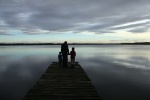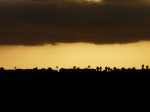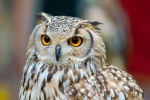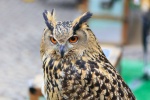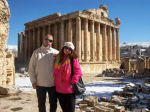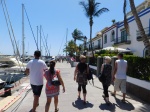Autor: Anónimo Fecha: Domingo, 01 Enero, 2006 ⭐ Puntos 5 (3 votos)
Beijing is located in northern China. The city has a population of 14 million people. The capital of the People's Republic of China, Beijing, it is the nation's political, economic, cultural and educational center. It has been the heart and soul of politics and society throughout the long history of this country.
The following text is my travelogue of my stay in Beijing in 2005. I hope that you enjoy with this story.
FRIDAY. We boarded the bus for the city tour, then headed for the Grand View Garden Hotel to pick up the other folks. We went first to the north end of Tiananmen Square. Unfortunately, the Chinese government had closed Tiananmen Square around the first of November for several months of renovations. There was a screen all the way around the square, and all you could see was big construction equipment and piles of the old concrete paving which is being replaced with granite pavers. The renovations are scheduled to be completed in time for the October 1, 1999, commemoration of the 50th Anneiversary of the Communist victory in China. I guess I'll have to come back to Beijing again to see Tiananmen Square. After seeing what little we could of the square, we crossed the street (Dongchang'an Jie) through a pedestrian underpass and were in front of the famous Tiananmen Gate of the Forbidden City (you can't miss it - it's huge and has a big portrait of Mao on it). For the next two hours we toured the Forbidden City. This tour just hits the highlights. You could easily spend a few days here if you really want to see everything. I had seen pictures of this place when every inch was jam packed with tourists, but today there are only a few tourists (mostly Japanese), a real plus for us. There are a lot of steps and ramps, and many of them are still coated with ice from two recent snows. If you want a preview of the Forbidden City, you should rent a video of 'The Last Emperor,' a historical film about China's last emperor which was filmed on location in the Forbidden City. While we were there, we had a group photograph made. For $7, it's a great souvenir (the photographs were put into nice picture booklets and delivered to the hotel later in the day). We exited the Forbidden City through the Gate of Martial Prowess on the north end and waded through a sea of vendors. Unfortunately, on our first day in Beijing, these were the most aggressive vendors we encountered during the entire trip. I found myself desperately looking up the Chinese words for '@#$%& you, leave me the hell alone,' but my phrasebook failed me. We then boarded the bus and headed for the Friendship Hotel, where we had a terrific lunch. They brought out a huge variety of dishes, and we pigged out. There was so much food that we couldn't eat it all. They had Chinese beer, soft drinks, and mineral water to drink. You could use chopsticks if you were daring, or western silverware if you weren't. Some people tried the chopsticks and made a real mess, but it was fun trying. During the morning tour, Judy had been pushing an optional Summer Palace tour for $32, and almost everyone signed up, so after lunch, we drove to the entrance of the Summer Palace. This is one of the 'must see' sights of Beijing. It's a walking tour, but like most places in Beijing, it's flat as a pancake. The Summer Palace is beside Lake Kunming, which was frozen over with ice, as were all the lakes that we saw in Beijing. When we exited the Summer Palace, we again ran into the ubiquitous vendors, but they weren't too aggressive, and we had a good time browsing and buying some souvenirs. That night, back at the hotel, Mary, the young Chinese lady who was going to guide and interpret for me, telephoned. We arranged to meet the following night in the hotel.
SATURDAY. This is the day I have been waiting for. We're going to the Great Wall of China! The bus leaves at 8:00 AM, and since Judy has already picked up the three people staying at the Grand View Garden Hotel, we drove directly to the Badaling Expressway and headed for the Great Wall. On the way, we stopped at a freshwater pearl factory and saw how the pearl oysters are processed and watched the workers sorting, grading, and drilling the pearls. The freshwater pearls are from the nearby Ming Reservoir. The pearl jewelry that the factory sells is beautiful, but as we learned later, you can buy the same stuff in the Beijing markets for much less (I bought a pair of pearl earrings for my wife for US$15 - I saw the same earrings later in Beijing for US$2.50!). When we left the factory, we then drove straight to the Great Wall at Badaling. I had read that the Great Wall at Badaling was unbelievably crowded during the warmer months, but today there are only a couple of hundred people at most. Apparently the goal for most people was to climb the wall to a tower high up the mountainside, several hundred feet above where we first stepped onto the wall. Some of our group made it. I got about halfway up, where the step risers were about two feet high, before my legs turned to rubber. I could lie and tell you that I gutted it out and fearlessly made for the summit, but frankly at this point the tower on top may as well have been Mount Everest. I had been having a serious problem recently with sciatica, so my legs were weak from lack of exercise, and I did well just to get halfway up. In any case, I have now walked on the Great Wall of China, and that's an incredible feeling. Returning to the parking lot, I bought a couple of 'I Climbed the Great Wall' T-shirts, one in English and one in Chinese. Unfortunately, the Chinese sizes are not even remotely the same as ours, and the XXL shirts that I bought would probably fit an average 8-year old kid. Well, for $2.50, I can't complain. While I was shopping, I met Anne, one of the ladies in the group I was with. While we were talking about what we were going to do in Beijing, I told Anne that I was going to meet a Chinese girl who would be my guide and interpreter. When I mentioned that the girl worked in a traditional Chinese medical clinic, she got real excited and told me that one of her reasons for coming to Beijing was to visit one of these clinics. I then invited her and her friend Jenny to meet Mary when she came to the hotel that night. After we left the Great Wall, we went to a Friendship Store and had another great lunch. Afterwards, we shopped in the store, which, like the other Friendship Stores, had some really nice but pricey things. I bought a beautiful embroidery on silk for 400 yuan ( about US$48 ). The design is embroidered on both sides, you have to see it to believe it. Some people bought some cloisonne, which was really expensive, but it was gorgeous stuff. We then left the Friendship Store and drove a few miles to the Ming Tombs. We went through the Ding Ling tomb, one of the tombs that has been excavated and is open to the public.
It was okay, but it paled in comparison to the thrill of walking on the Great Wall. All in all, the Ming Tombs aren't that big a deal, but the Great Wall tours generally go here as well, since they are on the way. On the way back to Beijing, we stopped at a jade factory. It was really interesting seeing how jade is cut and polished into an incredible variety of shapes, but the merchandise was horribly expensive, and, as we learned later, was much cheaper in the Beijing markets. That evening, Mary came to the hotel. I called Anne and Jenny (they both live in Toledo, Ohio, but Anne lived in New York for some time, and her accent gives her away), and they came to my room to meet Mary, too. Mary said that she could get off work for three days a month and that she would be able to be with me on Monday through Wednesday. Anne and Jenny asked Mary endless questions about Chinese medicine, and she very patiently answered them all. Mary had a real workout on her English, with my southern drawl, Anne's New York accent, and Jenny's Greek-American speech! We were so fascinated with Mary that we could have stayed up talking for hours, but finally I pointed out that it was getting late and that we should let Mary go home. Before leaving, Mary agreed to take Anne, Jenny, and me to her clinic on Monday afternoon.
SUNDAY. This morning I walked up the street a couple of blocks to the famous Silk Market, a long alley so narrow that it would be terribly claustrophobic when crowded with shoppers in the warmer months. If you want clothes, this is the place. They have many name brands, but some of it is possibly counterfeit. I bought a couple of really nice gold Rolex watches for US$14 each, which the vendor assured me were genuine. I guess it's the low overhead that explains why Rolexes that cost thousands of dollars in the US only cost a few dollars in China. I was also offered CD ROM software and music several times. I followed one of the shills to an alley, where her associate showed me everything that Microsoft makes for the low low price of only US$10. Discounts are available, however, and you can actually get this stuff for a mere US$5 with any sales resistance at all. I declined to buy any when I was informed that they did not give receipts or registration cards. I did give the girl US$2 to take a picture of the stack of CD ROMs, although she refused to pose with them. After leaving the Silk Market, I walked back toward the hotel and went on down another block to the China World Trade Center, a spectacular new high-rise building with a shopping mall on the lower floors that is as upscale and modern as any place I have ever seen. I went up to the second floor and found the Internet Café, one of several in Beijing. For about US$2, I got Internet access and sent several emails to friends back home. While I was there, I looked out a window and saw that it had started snowing heavily. When the snow stopped falling about an hour later, there was about an inch of the stuff on the ground. After lunch, I went on a hutong tour. The bus took us to a suburban neighborhood, where we got into pedicabs and went on a tour of the hutongs, which are like narrow alleys, where many Beijingers live. We actually visited one family (six people of three generations) in their tiny one-room home (plus a kitchen). Our first impression was that everything was pretty primitive, but they actually had a color TV, air conditioner, boombox, and a washing machine. We asked questions (the guide Judy interpreted), and they didn't mind if we took photographs. After that we went to a neighborhood community center, where several older men taught the younger people the art of painting and calligraphy. I bought a pretty water color on silk for about US$10. We also visited a beautiful garden that was formerly owned by a Chinese emperor of the Qing Dynasty. Unfortunately for us, it was Sunday, when kids are not in school, or we would have visited a local kindergarten. That evening, I went with Susan and Mina to the Beijing Hard Rock Café, where we dined and bought souvenir hats and shirts. The manager of the favorite restaurant of my wife and I had asked me to get a Beijing Hard Rock Café hat for his Hard Rock hat collection (he was absolutely thrilled when I gave it to him after returning home - apparently, Beijing is one of the toughest ones for a collector).
MONDAY. Mary arrived at 9:00 AM, and we set off for the Yonghegong Buddhist Lamasery. This is a real working Buddhist Temple. You pass through a series of courtyards and buildings, with one or more Buddhas in each building. The highlight is a gigantic 18-meter-high Buddha. Outside of each building you can get incense sticks and burn them while gazing on Buddha inside the building. There were a number of Japanese tourists here, and many of them were apparently Buddhists, because they looked really serious about kneeling and burning the incense. In the gift shop, one of Mary's friends who works here demonstrated an ancient Chinese musical instrument called a xun. It looks like a clay pot which tapers to a small hole at the top, with small holes in the sides for your fingers. Mary's friend makes it sound like heavenly music when she blows across the top. I bought one for US$30 (I never could make it sound even remotely like the girl in the gift shop, but at least it looks cute on a stand). After leaving the lamasery, we walked a couple of blocks to the Confucius Temple, which was also very interesting. You can easily do both of these places in a couple of hours. Mary and I then returned to the hotel for a quick lunch, and we met Anne and Jenny at 1:30 to go to Mary's clinic. We got to the clinic at about 2:00. Mary first showed us the pharmacy, where you can buy almost any of the herbs, pills, and other elements of Chinese medicine. They had exotic stuff like snake wine (it's a bottle of wine with a big snake in it), dried seahorses, and lots of other weird stuff. Then Mary took us into an examining room and showed us drawings of the human body and the accupressure points and the so-called meridians, and she explained the Qi energy principles. When she had finished, the doctor came in and began to examine Anne. He did this by putting his hands on her wrists and feeling her pulse for several minutes. During this time, he asked Anne several questions about her medical history and how she was feeling. Periodically, he would make comments about his findings. Mary was translating all this. When he was finished, he prescribed some Chinese herbs for Anne. These were pretty expensive, but Anne bought a month's supply to take home and try. The doctor then examined Jenny, but she declined to buy the prescribed herbs. Afterward, Anne decided to have a Chinese accupressure massage. She got a full hour for about US$16. She said that it felt great and was a bargain for the price. After the clinic, we went to the Hongqiao Market, across the street from Tiantin Park. If you go shopping only one time in Beijing, this may be the best choice. It's a big building with three floors and a basement. There are hundreds of individual vendors inside. One entire floor is a pearl market, and the prices are stupendously low (this is where I found the same pearl earrings that I paid US$15 at the factory for only US$2.50). You can find just about everything here, including clothes, shoes, watches (more Rolexes!), electronics, cameras, and every kind of knickknack in the world. The best part by far, for me, was the meat and seafood market in the basement. I could have shot a whole roll of film here. If it walks, swims, flies, or slithers, they have it here, and a lot of the meat is still alive. Some of the stuff was so bizarre that even Mary didn't recognize it, but she asked the vendors and they told her, then she translated for me. I worried at first if the vendors might resent a 'lao wai' like me perusing their wares and taking a lot of photographs, but they were all very friendly and didn't seem to mind a bit. Suffice to say that if you really want to be grossed out, this is the place. It's also a great place for weight-watchers, because I certainly had no appetite the rest of the day! On the way back to the hotel, we stopped at the main Beijing railway station and bought tickets for a train trip to Tianjin the next day.
TUESDAY. At 8:15 AM, Mary met Anne, Jenny, Susan, Mina, and me at the hotel, and we headed off for the railroad station. With Mary leading the way, we boarded the right passenger car and found our reserved seats ('soft seat') on the 9:00 express train to Tianjin. I had really wanted to ride a Chinese train, but I have to tell you that unless you speak Chinese, this could be difficult. Although Beijing is gradually becoming easier for English-speaking foreigners (newer street signs are bilingual and public toilets are labeled 'WC'), I did not see any signs in English in the station. I have been told that there is a ticket window for foreigners, but I did not see one, and I don't know how you would find it. With Mary checking the schedule and buying the tickets, it was a snap. The train itself was as comfortable and modern as anything that I have ever seen, and we enjoyed the ninety-minute trip. The landscape on the north China plain was nothing spectacular, consisting mostly of farms, but the ride was smooth and hostesses went through the cars selling snacks and magazines, and each car had a western-style toilet (however, don't use the toilet in the station - you'll understand why when you see it). During the trip, Mary and I did English 101, which we both enjoyed tremendously. Tianjin is one of China's largest cities, with seven million people. Luckily for us, Mary had been to Tianjin for the first time only a month before, with my Australian Internet friends, so she knew where to take us. As soon as we arrived, we went to the ticket windows and Mary bought our return tickets to Beijing (for some reason, they don't sell round-trip tickets). We then exited to the large plaza in front of the station, where we got a couple of taxis to take us to one of the shopping streets. The street, which was really a pedestrian-only alley, was a shopper's paradise, with all kinds of antiques (probably as authentic as the Rolexes) and other stuff. I bought some Yin Yang balls for about US$1.50 - they make great little gifts, but they're heavy and you have to lug them around with you all day. It was pretty cold today, around 25 degrees F (-4 C) and poor Mary was shivering and stamping her feet, so after about an hour, we quit shopping and went by taxi to a food market inside a huge cross-shaped building. The lower floor was full of vendors selling every kind of food imaginable and then some. They had brightly colored dried fruits, nuts, candies and confections, pastries, plus meats and seafood. After buying some nuts and pastries, we went upstairs, which was a series of restaurants. Mary chose one and we went in and ordered several dishes, including sweet and sour shrimp, steamed shrimp and rice, and a small mountain of pork dumplings. It was all delicious, and the check was a miniscule US$11 for the six of us (actually, only four - Susan and Mina are vegetarians, and I think they were grossed out by some of the unmentionable stuff in the meat market on the lower floor - let's just say that we saw no stray dogs in China and let it go at that). The highlight of the meal was when someone at another table ordered snake and a fellow from the meat market on the lower level entered the restaurant with a very large live snake wrapped around his arm. Jenny looked up and saw the snake hissing at her from about two feet away. I thought we were going to have to give her CPR, she was so terrified. Even now, I laugh when I think about the look on Jenny's face when she saw that snake (sorry, Jenny). After this gut-busting feast, we returned to the station and went back to Beijing on the train. Tianjin was a real treat. Unlike Beijing, where western tourists seem to be common enough nowadays, I don't think that Tianjin has many westerner tourists. Everywhere we went, people looked at us, and anyone who knew even a few words of English came up to us and spoke. Also, in the restaurant, they only had chopsticks and those ceramic Oriental spoons, a sure sign that western tourists don't come here very often.
WEDNESDAY. Regretfully, this is my last full day in Beijing. I have grown to love this fascinating place and I really hate to leave. Mary comes to the hotel at 9:00 AM, and we head off in a taxi for the Big Bell Temple (also called the Great Bell Temple). On the way, the taxi ran out of gas. Unbelievably, there is a gas station across the street (unbelievable because I had seen only a few gas stations the whole time I was here). The driver got a can from the trunk and got gas, and we were on our way in a few minutes. The Big Bell Temple was terrific. It's not really blurbed in most guidebooks, but it's definitely worth a look if you have the time. It's basically a museum of bells, from little to big, from ancient to relatively modern. The biggest bell is a behemoth weighing 46 tons. It must be over twenty feet high! You can go up some narrow steps to the top and try your hand at tossing coins through a small hole in the top. I got two coins in the hole, which is supposed to ensure good luck. In one room, there is a history of Chinese bells, with a guide who narrates in Chinese. The guide went through her spiel and Mary translated for me. You can do the temple in an hour or less. We left the temple and headed for Tiantin Park and the Temple of Heaven. On the way, however, Mary started feeling a little sick, and I asked her if she wanted to go home. She said that she preferred to go back to my hotel, where we could practice more English until she felt a little better. We did more English 101 for several hours. After a couple of hours, Mary said she felt better (it must have been the Snickers and Peanut M&Ms I fed her), but I was having so much fun with the English practice, I didn't want to quit, and I think she wanted to keep on also. We filled reams of notebook paper with words and pictures, and she even tried to teach me a little Chinese (I'm hopeless, however). Finally, around 4:00 in the afternoon we both knew that she would have to leave for home to beat the tremendous traffic jam that Beijing becomes during commute times. I went outside with her and she called a taxi (she usually takes the bus, but I knew she was still a little under the weather, so I made her take some money for a taxi). I gave her a little hug, and she left for home. A little later, I went to the Silk Market for the last time with Anne and Jenny. They both wanted to get some of the (alleged) silk mufflers. The vendors seemed to be stuck on 50 yuan for these, but Jenny said that we were going to get them for 40 yuan (a little less than US$5) if we had to kill one of these guys. Finally, one of the vendors said okay to 45 yuan, but he wouldn't go any lower. Jenny, who is a Greek-American, then went into the stall with him and proceeded to unload on the poor guy in Greek. We didn't understand a word of it, but I imagine that any nearby Greek sailors would have had their ears singed. Anyway, the vendor surrendered to the Madwoman of Toledo, and we filled our bags with 40-yuan mufflers. I'm thinking of inviting Jenny to Atlanta to be chief negotiator the next time I buy a new car. On the way back to the hotel, we stopped for dinner at the McDonalds near the hotel. It's just like the McDonalds in the US. The kids in Beijing love McDonalds - it was packed with teenagers. I took a photograph of Anne sitting next to Ronald McDonald (always remember: growing old is required; growing up is optional). After McDonalds, we went into a grocery store, so that Anne and Jenny could buy some Chinese green tea to take home. Jenny is amazing - she tries to get the store to knock down the price. I think she has bargained so much this week in the street markets that's she's locked into discount mode. Well, back to the hotel now and begin the sad job of packing.
THURSDAY. I'm up at 6:00 AM. Time for a quick breakfast, then take the suitcases downstairs and get on the bus for the airport. Checking in at the airport and going through the departure procedures is a little more of a hassle than when we arrived, but not too bad. The Northwest flight departs right on time, and we're off for a 13-hour flight that will take us up across Manchuria, Siberia, the Bering Strait, over the northern part of Alaska, then down across Canada to Detroit. Then a short flight south to Atlanta and I'm home. There's my wife Deborah waiting for me, and that's always a great sight.
Nota:
Our China photo-gallery: China Pictures
Fecha: 01/Ene/2006 02:00:00
(20284 Lecturas)
 Puntos: 5 (3 votos)
Compartir:
Puntos: 5 (3 votos)
Compartir: 
